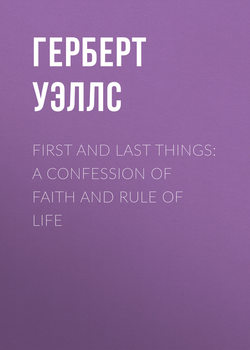Читать книгу First and Last Things: A Confession of Faith and Rule of Life - Герберт Уэллс, Герберт Джордж Уэллс - Страница 12
BOOK THE FIRST. – METAPHYSICS
1.11. BELIEFS
ОглавлениеYet it is of urgent practical necessity that we should have such propositions and beliefs. All those we conjure out of our mental apparatus and the world of fact dissolve and disappear again under scrutiny. It is clear we must resort to some other method for these necessities.
Now I make my beliefs as I want them. I do not attempt to distil them out of fact as physicists distil their laws. I make them thus and not thus exactly as an artist makes a picture so and not so. I believe that is how we all make our beliefs, but that many people do not see this clearly and confuse their beliefs with perceived and proven fact.
I draw my beliefs exactly as an artist draws lines to make a picture, to express my impression of the world and my purpose.
The artist cannot defend his expression as a scientific man defends his, and demonstrate that they are true upon any assumptions whatsoever. Any loud fool may stand in front of a picture and call it inaccurate, untrustworthy, unbeautiful. That last, the most vital issue of all, is the one least assured. Loud fools always do do that sort of thing. Take quite ignorant people before almost any beautiful work of art and they will laugh at it as absurd. If one sits on a popular evening in that long room at South Kensington which contains Raphael’s cartoons, one remarks that perhaps a third of those who stray through and look at all those fine efforts, titter. If one searches in the magazines of a little while ago, one finds in the angry and resentful reception of the Pre-Raphaelites another instance of the absolutely indefensible nature of many of the most beautiful propositions. And as a still more striking and remarkable case, take the onslaught made by Ruskin upon the works of Whistler. You will remember that a libel action ensued and that these pictures were gravely reasoned about by barristers and surveyed by jurymen to assess their merits…
In the end it is the indefensible truth that lasts; it lasts because it works and serves. People come to it and remain and attract other understanding and enquiring people.
Now when I say I make my beliefs and that I cannot prove them to you and convince you of them, that does not mean that I make them wantonly and regardless of fact, that I throw them off as a child scribbles on a slate. Mr. Ruskin, if I remember rightly, accused Whistler of throwing a pot of paint in the face of the public, – that was the essence of his libel. The artistic method in this field of beliefs, as in the field of visual renderings, is one of great freedom and initiative and great poverty of test, but of no wantonness; the conditions of rightness are none the less imperative because they are mysterious and indefinable. I adopt certain beliefs because I feel the need for them, because I feel an often quite unanalyzable rightness in them; because the alternative of a chaotic life distresses me. My belief in them rests upon the fact that they WORK for me and satisfy my desire for harmony and beauty. They are arbitrary assumptions, if you will, that I see fit to impose upon my universe.
But though they are arbitrary, they are not necessarily individual. Just so far as we all have a common likeness, just so far can we be brought under the same imperatives to think and believe.
And though they are arbitrary, each day they stand wear and tear, and each new person they satisfy, is another day and another voice towards showing they do correspond to something that is so far fact and real.
This is Pragmatism as I conceive it; the abandonment of infinite assumptions, the extension of the experimental spirit to all human interests.
